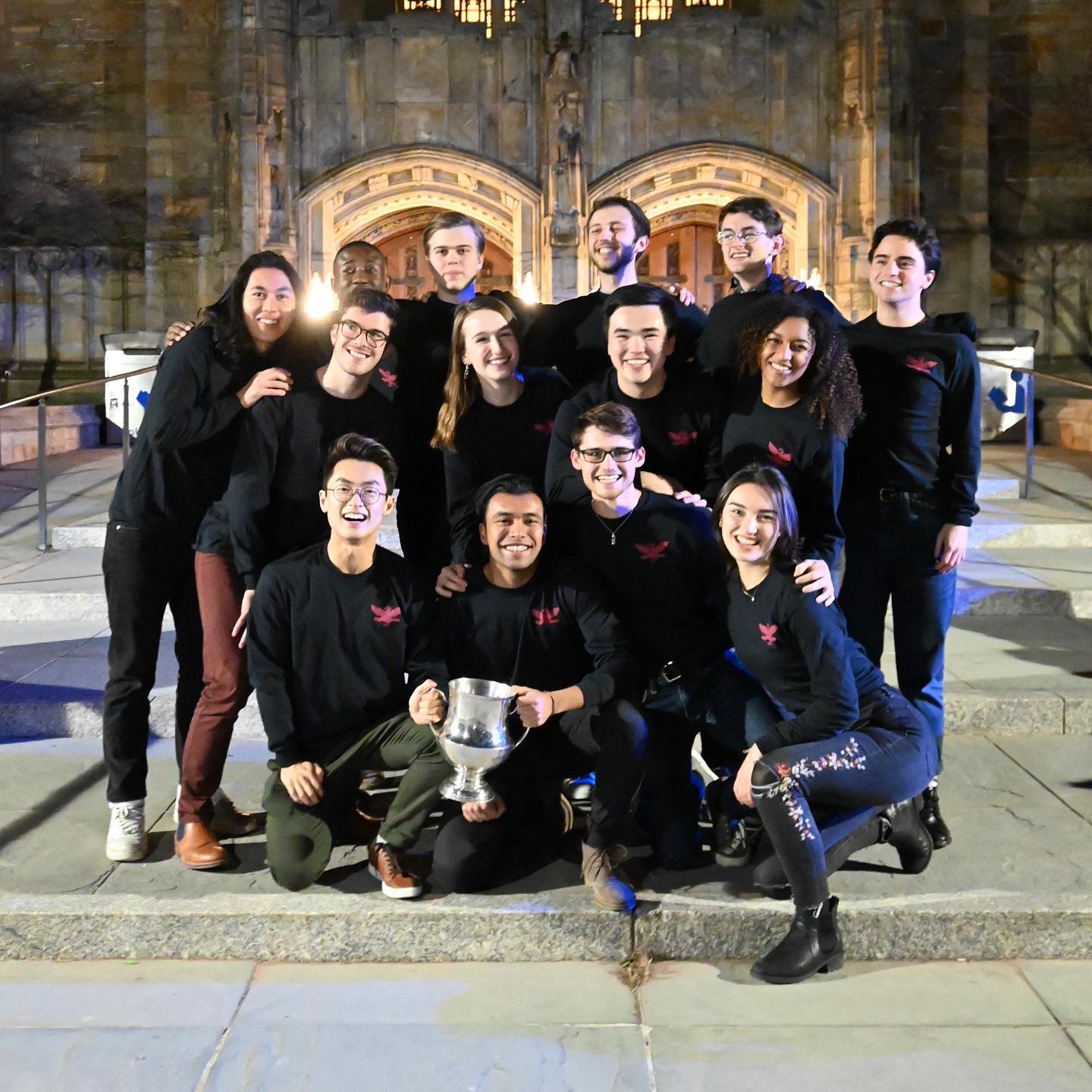
The Whiffenpoofs — a historically all-male senior a cappella group — admitted their first female singer, Sofía Campoamor ’19+1 in 2018. They continued to break tradition by admitting their first woman of color in 2019 — Neha Bhatt ’20+1 — and multiple non-male members in 2020: Morgan Baker ’21+1, Lauren Bond ’21+1 and Emma Rutan ’21+1.
“I think Yale College and the student body reflects inclusion for all people, and it’s about time that some of its older, more celebrated institutions follow suit,” Rutan said. “I don’t think gender integration will be a problem. It is something to explore and celebrate.”
Since the 1970s, the Whiffenpoofs held regular votes over the acceptance of women into the group. Members voted against admitting all genders due to concerns about disrupting the Whiffenpoofs’ traditional image as an all-male group, upsetting Whiffenpoof alumni and dishonoring Yale’s all-female senior-only a cappella group, Whim ’n Rhythm.
Although the Whiffenpoofs performed onstage with women and inducted honorary female members, they did not vote to admit female singers until 2018. Still, like all single-gender a cappella groups at Yale, the group accepted auditions regardless of gender.
In February 2017, a petition urging the Yale Whiffenpoofs to admit women to its next class of singers garnered more than 135 student signatures in a few days. Drafted by Claire Carroll ’18, the petition incited conversations about inclusivity in a cappella communities. That year, a record number of female and gender non-binary students auditioned for the group in defiance of their only-men policy.
Rebecca Young ’18, a member of the mixed-gender a cappella group Red Hot and Blue, said, “This isn’t about coed groups being better than all-female groups, it’s about personal preference. And my preference is to be in a coed space.”
But Jackie Ferro ’17, who signed Carroll’s petition and wrote an op-ed in the News calling for the Whiffs to include women, said the real need for the Whiffs’ integration stemmed from a disparity of financial and social resources — not the lack of a coed space. Mixed and all-female groups could not compete with the privilege enjoyed by all-male groups formed before the enrollment of women at Yale.
Amid growing pressures on the Whiffenpoofs to admit non-male members, the Duke’s Men of Yale — a traditionally all-male a cappella group — made a unanimous decision to abolish gender restrictions in July 2017. This continued inclusivity debates on campus.
In January 2018, breaking with more than a century of tradition, the Whiffenpoofs and Whim ’n Rhythm announced that both groups would consider accepting singers of all genders. Alumni from both groups were intimately involved in this decision, with over 200 Whiffs and Whims responding to an alumni survey.
Whim ’n Rhythm decided to begin describing itself as, “SSAA,” — or Soprano I and II and Alto I and II — rather than all-female, while the Whiffenpoofs used the label “TTBB,” or Tenor I and II, Baritone and Bass. A joint statement posted on Facebook called these terms “more informative of the art [they] create” and “more inclusive” to members. With these changes, the two groups hoped to “more explicitly link” together as two performing bodies representing the same Yale senior class.
Campoamor was admitted to the Whiffenpoofs that year. Before the Whiffenpoofs, she sang Soprano in a cappella group Mixed Company and Alto II in the Battell Chapel Choir.
“I hope that my joining the Whiffs will energize the conversation around senior a cappella,” Campoamor said after her induction. “I think it’s only the beginning — I don’t think we have finished creating an equitable and inclusive system for all senior a cappella singers.”
Bhatt, who was accepted to the group the following year, said that Campoamor inspired her to audition for the historically “white male institution” by breaking down an important barrier.
Mark Gustaferro ’20+1, the business manager of the Whiffenpoofs of 2020, said that for the past 108 years, the Whiffenpoofs have been “losing out on talent” by excluding non-males.
But even though the group accepted three non-male members this year, Gustaferro said he does not know whether the group will ever attain complete gender parity. He noted that the group currently does not have the “musical infrastructure” to support equally gendered numbers. The group would have to develop a SATB — Soprano, Alto, Tenor and Bass — repertoire to support different types of voices and vocal ranges.
Yet Gustaferro added that the Whiffenpoofs’ current class is “uniquely talented” and “exceptional,” with each individual harboring powerful soloistic potential. He said the group’s increased inclusivity will greatly benefit its musical aptitude.
“I don’t think the primary goal of the group has changed,” Gustaferro said. “It’s still to take the best senior vocalists and make really good music — inclusivity allows us to make better music as a group. That being said, I think we have augmented those principles with another principle, that the Whiffs accurately represent the talent at Yale and the pool of auditions we receive each year.”
Whim ‘n Rhythm was founded in 1981 and the Whiffenpoofs in 1909.
Marisol Carty | marisol.carty@yale.edu






